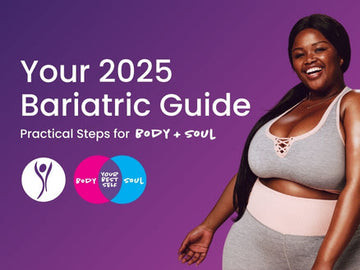by Anthony Benjamin on Oct 12, 2022

Being Comfortable in Your Skin: Life After Bariatric Surgery
 Weight loss surgery can be an exciting milestone in your life – but when it’s over, you may be unsure of what to do next.
Weight loss surgery can be an exciting milestone in your life – but when it’s over, you may be unsure of what to do next.
While your quality of life will improve, it will be very different from your life before surgery. It can also be challenging to adjust to life after bariatric surgery.
With these tips from ProCare Health, you can learn how to feel comfortable in your skin after weight loss surgery.
Physical Activity
Although bariatric surgery aids in weight loss, it is not the ultimate cure. When you work out after surgery, your body will become more efficient, which means you will start burning fewer calories.
To maintain weight loss, you need to increase the intensity and length of your workout routine gradually. Whether it be working out in a gym or walking a mile, you should aim for 150 minutes of physical activity per week.
Eating and Drinking
After bariatric surgery, it is important to follow a specific nutrition plan to achieve and maintain weight loss for years to come. Following your surgery, your doctor will provide you with a post-bariatric diet plan, which is made up of specific phases.
In the first week or two, you will follow a liquid diet. Slowly, you will be able to add pureed foods, followed by soft foods, into your diet. About eight weeks after surgery, you can begin eating regular foods again.
As you become accustomed to your new way of eating, there are certain guidelines you should incorporate into your daily routine:
- Eat healthy, balanced meals with small portions
- Follow a diet low in calories, fats, and sweets
- Record your calorie and protein intake daily
- Eat slowly and chew small bites of food thoroughly
- Avoid rice, bread, vegetables, fruit, and meat that are not easily chewable
- Avoid sugar, foods containing sugar, concentrated sweets, and fruit juices
- Your daily caloric intake should not exceed 1,000 calories
Additionally, to avoid dehydration, you should try to drink 64 ounces (eight cups) of water every day.
Vitamins and Supplements
 Weight loss surgery affects how your body absorbs nutrients. Malabsorptive bypass procedures like the Roux-en-Y (RNY) and duodenal switch (DS) are known to cause micronutrient deficiencies because portions of the small intestine where nutrient absorption occurs are bypassed. While it doesn’t involve intestinal bypass, the sleeve gastrectomy can also lead to certain nutritional deficits. Furthermore, any weight loss surgery can result in malnutrition if a proper diet isn’t followed.
Weight loss surgery affects how your body absorbs nutrients. Malabsorptive bypass procedures like the Roux-en-Y (RNY) and duodenal switch (DS) are known to cause micronutrient deficiencies because portions of the small intestine where nutrient absorption occurs are bypassed. While it doesn’t involve intestinal bypass, the sleeve gastrectomy can also lead to certain nutritional deficits. Furthermore, any weight loss surgery can result in malnutrition if a proper diet isn’t followed.
To avoid nutrient deficiencies and to ensure your body stays healthy, weight loss surgery patients must add bariatric-specific vitamins, minerals, and supplements into their everyday routine. Some examples of supplements include:
- Multivitamin
- Vitamin B12
- Calcium
- Iron
- Protein
By incorporating vitamins and supplements into your diet, you will also help your body heal, enhance your quality of sleep, strengthen energy levels, and increase muscle strength.
Pregnancy
 If you want to have a baby after bariatric surgery, you absolutely can. However, there are specific guidelines you should keep in mind.
If you want to have a baby after bariatric surgery, you absolutely can. However, there are specific guidelines you should keep in mind.
Most doctors recommend that you wait 12 to 18 months to get pregnant. After surgery, the body experiences stressful changes and significant nutrient deficiencies, which can cause issues for a developing baby.
By waiting at least a year, you can achieve a stable weight, reduce the risk of maternal and fetal malnutrition, and provide your baby with necessary nutrients.
Still, there are certain risks associated with pregnancy after weight loss surgery:
- An increased risk of minor complications for mothers, including chest infections, symphysis-pubis dysfunction, headaches, and heartburn.
- An increased risk of major complications for mothers, including pre-eclampsia, postpartum hemorrhage, infection, intrauterine death, and an emergency C-section.
- An increased risk of issues for the baby, including heart defects, spina bifida, limb reduction defects, and ADHD.
If you worry about these risks or your chances of becoming pregnant, you should consult your doctor or bariatric surgeon. For more information, see Pregnancy After Weight Loss Surgery.
Smoking
To lower the risk of future complications, your surgeon will ask you to stop smoking at least six weeks before surgery. Smoking can lead to decreased blood supply in your body’s tissue and delay healing. It is also linked to several conditions:
- Blood clots
- Marginal ulcers after gastric bypass
- Heart disease
- Lung disease
- Increased risk for hip fracture
- Cataracts
- Cancer of the mouth, throat, esophagus, larynx, stomach, pancreas, bladder, cervix, and kidney
Alcohol
Ultimately, alcohol consumption is not recommended after bariatric surgery, as alcohol contains little to no nutritional value. After surgery, alcohol is absorbed into your stomach more quickly than before, making the sedative and mood-altering effects more difficult to predict and control.
However, if you decide to drink alcohol after weight loss surgery, you should remember these tips:
- Avoid alcohol for the first six months after surgery
- Avoid carbonated beverages and sugary drink mixers
- Only drink with meals or while eating to help slow absorption of alcohol
- Be aware of the calorie content of alcohol
- Have your first drink after surgery at home in a safe environment to monitor how you react
ProCare Health Helps You Create Healthy Habits After Weight Loss Surgery
 At ProCare Health, your health is our top priority. We provide you with a variety of products, from a multivitamin specifically designed for bariatric patients to other supplements that you need to stay healthy.
At ProCare Health, your health is our top priority. We provide you with a variety of products, from a multivitamin specifically designed for bariatric patients to other supplements that you need to stay healthy.
We also have Facebook, Instagram, and Twitter pages, as well as regular emails and articles with wellness tips, recipes, motivation, and more to help you on your journey to a healthier lifestyle.
We strive to provide you with only the best in quality because we know how important it is to your health and well-being. Feel free to contact us with questions or to place an order today!
Please note: the information contained within this article is in no way to be considered medical advice nor is it meant to replace your medical team’s recommendations. This article’s purpose is to educate and allow the reader to make informed decisions with the help of his or her medical team.

Your 2025 Bariatric Guide: Practical Steps for Body + Soul

Your Go-To Guide for Bariatric-Friendly Travel

Exploring the Impact of Weight Loss on Bone Density

